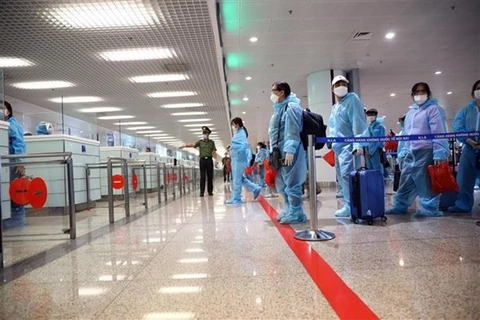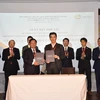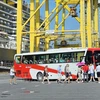
Hanoi (VNA) – It is not easy to keep the COVID-19-stricken tourism industry moving forward given that the pandemic uncertainty still lingers with the rise of various new coronavirus variants, Deputy Director of the Vietnam National Administration of Tourism (VNAT) Ngo Hoai Chung told a recent meeting on tourism.
Fortunately, vaccination rollouts gather pace around the world together with the launch of the so-called “vaccine passport” or “digital vaccination certificate”, offering a glimmer of hope for the safe resumption of international travel and the recovery of the sector.
Additionally, a number of new digital tools have been introduced as proof of travel history and vaccination against COVID-19 or testing negative with the virus for travellers to show to airlines or competent authorities. They are expected to help speed up border reopening all over the world.
 Foreign visitors take a tour around Hanoi’s Temple of Literature in the pre-pandemic time. (Photo: VietnamPlus)
Foreign visitors take a tour around Hanoi’s Temple of Literature in the pre-pandemic time. (Photo: VietnamPlus) Earlier this month, the International Air Transport Association announced the rollout of its new Digital Travel Pass, an app that allows governments and airlines to collect, access and share encrypted information related to passengers’ COVID-19 test and vaccination status prior to travel.
The World Economic Forum and Common Project, a Swiss non-profit organisation, have co-created a similar app – Common Pass – which is being piloted, to allow travellers to document their medical status electronically.
Launched by IBM, Digital Health Pass, meanwhile, lets organisations verify health credentials for anyone entering their site, based on criteria they set like COVID-19 test results, vaccine records and temperature checks. It is designed to help organisations re-open their business or bring people back to physical locations safely, such as an office building, school, stadium or airport.
In a meeting in Spain’s Madrid in January, the World Tourism Organisation (UNWTO) focused its discussions on the integration of vaccines into a harmonised approach to safe travel and launching a coordinated effort to boost confidence in the sector.
With countries around the world now rolling out vaccines against COVID-19, its Global Tourism Crisis Committee noted that this opens a critical window in the fight against the pandemic and to promote the safe resumption of international travel, heard at the meeting.
 2021 is likely to be another year for the tourism industry to rely on domestic travel. (Photo: VietnamPlus)
2021 is likely to be another year for the tourism industry to rely on domestic travel. (Photo: VietnamPlus) Members highlighted the importance of steeping up coordination of vaccination certificates to ensure the implementation of common, harmonised digital related travel principles, protocols and documents.
They also called for firm actions to support the standardisation, digitalisation and interoperability of testing protocols and certification systems, based on commonly agreed evidence and risk-assessment indicators for origin and destination country or territory.
It is not unprecedented for people to be asked to show physical proof of vaccination against diseases, like yellow fever, rubella or cholera when travelling to certain countries.
After vaccination, travellers will receive a Yellow Card known as the International Certificate of Vaccination which are required by Centres of Diseases Prevention and Control (CDCs) around the world.
Holding a “vaccine passport” or any other document proving that an individual is free from a disease and cannot spread it among the community must be welcomed, said Pham Hai Quynh, CEO of Van Hai Xanh Travel. Such move is among things the tourism industry needs for recovery, he said./.
| The COVID-19 pandemic has taken heavy toll on Vietnam’s tourism as it has forced more than 500 travel agencies to close. Some 90 – 95 percent of them have suspended operation, while the occupancy rate stood at just around 10 – 20 percent. There has been a major trend in which tourism workers are switching to other sectors. As a result, the smoke-free industry will be not likely to recover to the pre-pandemic level until the next 5 – 7 years. |






















